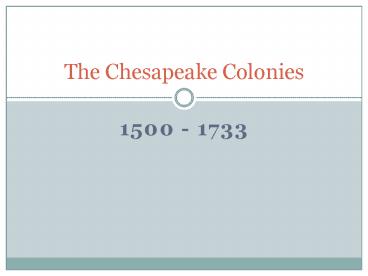The Chesapeake Colonies - PowerPoint PPT Presentation
1 / 29
Title:
The Chesapeake Colonies
Description:
Jamestown First permanent English settlement. The Charter of ... John Smith Military commander who took control over Jamestown and set colonists to work ... – PowerPoint PPT presentation
Number of Views:98
Avg rating:3.0/5.0
Title: The Chesapeake Colonies
1
The Chesapeake Colonies
- 1500 - 1733
2
Early English Settlement
- Reasons for English Colonization?
- English cities were overcrowded with displaced
farmers - Foreign rivalries
- Colonies would open up new markets and resources
- England promoted overseas exploration under the
reign of Elizabeth I - Sir Walter Raleigh
- Sir Francis Drake
Sir Walter Raleigh and his son.
3
Early English Settlement
- In 1584 Raleigh sailed to the outer banks off the
coast of North Carolina - Named the region Virginia after the virgin queen
Elizabeth I - England settled its first colony at Roanoke in
1587
Portrait of Elizabeth to commemorate the defeat
of the Spanish Armada
4
Roanoke The Lost Colony
- In 1588, England went to war with Spain
- Elizabeth recalled all ships for the war effort
- The war prevented supplies from reaching Roanoke
- In 1590 when English supply ships returned to
Roanoke they found the colony deserted - Where did the colonists go?
A map of the Roanoke area, by John White.
5
(No Transcript)
6
Virginias Beginnings
- Joint Stock Company Allowed for investors to
pool money to fund expeditions to the new world - Virginia Company of London - Funded the
establishment of Jamestown in Virginia in 1607 - Jamestown First permanent English settlement
7
The Charter of the Virginia Company
- Guaranteed to colonists the same rights as
Englishmen as if they had stayed in England. - This provision was incorporated into future
colonists documents. - Colonists felt that, even in the Americas, they
had the rights of Englishmen
The Virginia Company published a series of
promotional tracts to encourage investments and
emigration.
8
(No Transcript)
9
Jamestown Housing
10
(No Transcript)
11
(No Transcript)
12
Jamestown
- In the early years Jamestown was a disaster
- Settlers found no gold or silver to send to
investors back home - Many colonists lacked necessary skills for
setting up a colony - John Smith Military commander who took control
over Jamestown and set colonists to work
Captain John Smith, from his 1614 map of New
England
13
Pocahontas
A 1616 engraving of Pocahontas by Simon van de
Passe.
Pocahontas saves Captain John Smith
14
(No Transcript)
15
The Powhatan
- Powhatan dominated a few dozen small tribes in
the James River area when the English arrived. - The English called allIndians in the
areaPowhatans. - Powhatan probably sawthe English as allies in
his struggles to control other Indian tribes in
the region.
Chief Powhatan in a longhouse at Werowocomoco
(detail of John Smith map, 1612)
16
(No Transcript)
17
Cultural Clash in the Chesapeake
- Relations between settlers and Indians got worse
- Cultural differences
- English raided villages for supplies
- First Anglo Powhatan War 1610-1614
- Eventually the Virginia Company called for a
state of perpetual war against the natives - Drove natives westward
Indian massacre of 1622, depicted as a woodcut.
18
James Town Turns a Profit
- Desperate to turn a profit, company directors in
England implemented 3 measures - The introduction of Tobacco
- House of Burgesses First representative
assembly in North America - Headright System Provided lands for heads of
households and their families - In 1624 King James revoked the Virginia Companys
charter and declared Virginia a royal colony
19
Life and Labor in the Chesapeake
- Indentured Servants Migrants who were
contracted to work for a number of years in
return for passage the a colony - Poor living conditions and grueling work
- Conditions of life were much worse than back in
England - Shorter lifespan on average
Indenture certificate from 1738.
20
Colonial Slavery
- First Africans arrived in Virginia in 1619
- Status was unclear
- As the number of slaves in the colony increased
colonists reacted to put down the perceived
racial threat - Slavery transformed from an economic to a racial
institution - Slave Codes
- Made blacks and their children property, or
chattel for life of white masters - In some colonies, it was a crime to teach a slave
to read or write
English tobacco label.
21
Population in the Chesapeake
Why this large increase in black population?
22
The Atlantic Slave Trade
23
The Middle Passage
24
Bacons Rebellion 1676
- Nathaniel Bacon Virginia farmer who organized a
rebellion against the Virginia government - Was angry over what he considered a weak stance
on Indian removal - Organized poor planters and ex-servants to remove
Indians and overthrow the Governor of Virginia - Rebellion was eventually suppressed after the
death of Bacon - Largest colonial uprising prior to the American
Revolution
Nathaniel Bacon
25
(No Transcript)
26
Impact of Bacons Rebellion
- It exposed resentments between inland
frontiersmen and landless former servants against
gentry on coastal plantations. - Socio-economic class differences/clashes between
rural and urban communities would continue
throughout American history. - Upper class planters searched for laborers less
likely to rebel - Black slaves
27
Founding Maryland
- In 1632 George Calvert, Lord Baltimore, received
a charter to create a proprietary colony - Intended to be a safe haven for English and Irish
Catholics - Why did they need protection?
- This colony became Maryland
- Despite Calverts original intentions, Protestant
servants soon made up the majority of the
colonys population
George Calvert
28
(No Transcript)
29
A Haven for Catholics
- Baltimore permitted a high degree of freedom to
worship in Maryland - Waned to avoid a repeat of the persecution of
Catholics found in England
- Toleration Act of 1649
- Guaranteed toleration to all Christians
- Decreed death to those that denied Jesus Christ
The Maryland Toleration Act































